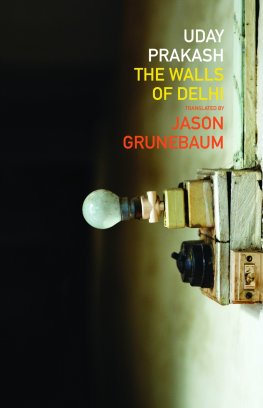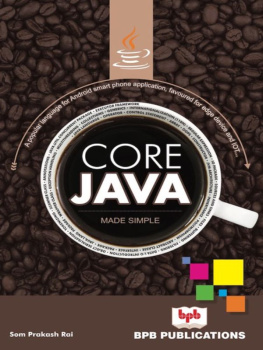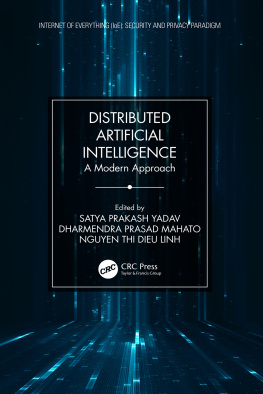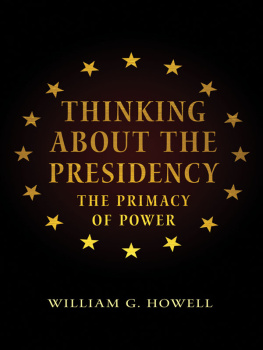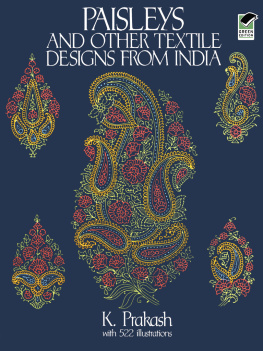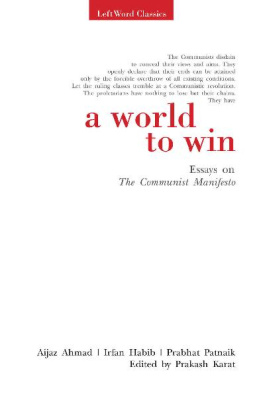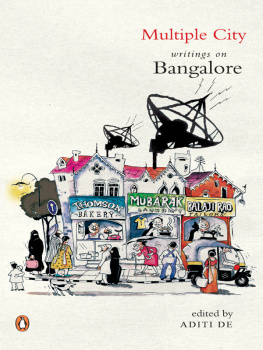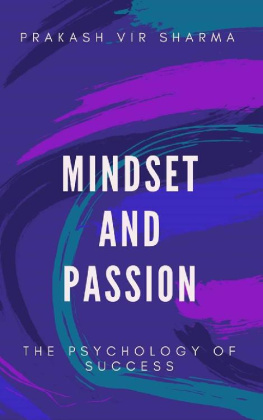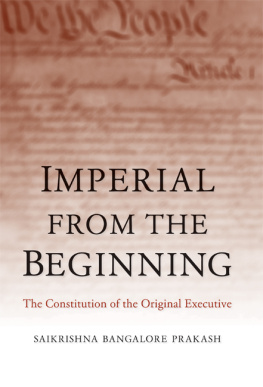Saikrishna Bangalore Prakash - The Living Presidency: An Originalist Argument against Its Ever-Expanding Powers
Here you can read online Saikrishna Bangalore Prakash - The Living Presidency: An Originalist Argument against Its Ever-Expanding Powers full text of the book (entire story) in english for free. Download pdf and epub, get meaning, cover and reviews about this ebook. publisher: Harvard University Press, genre: Politics. Description of the work, (preface) as well as reviews are available. Best literature library LitArk.com created for fans of good reading and offers a wide selection of genres:
Romance novel
Science fiction
Adventure
Detective
Science
History
Home and family
Prose
Art
Politics
Computer
Non-fiction
Religion
Business
Children
Humor
Choose a favorite category and find really read worthwhile books. Enjoy immersion in the world of imagination, feel the emotions of the characters or learn something new for yourself, make an fascinating discovery.

- Book:The Living Presidency: An Originalist Argument against Its Ever-Expanding Powers
- Author:
- Publisher:Harvard University Press
- Genre:
- Rating:5 / 5
- Favourites:Add to favourites
- Your mark:
- 100
- 1
- 2
- 3
- 4
- 5
The Living Presidency: An Originalist Argument against Its Ever-Expanding Powers: summary, description and annotation
We offer to read an annotation, description, summary or preface (depends on what the author of the book "The Living Presidency: An Originalist Argument against Its Ever-Expanding Powers" wrote himself). If you haven't found the necessary information about the book — write in the comments, we will try to find it.
The Living Presidency: An Originalist Argument against Its Ever-Expanding Powers — read online for free the complete book (whole text) full work
Below is the text of the book, divided by pages. System saving the place of the last page read, allows you to conveniently read the book "The Living Presidency: An Originalist Argument against Its Ever-Expanding Powers" online for free, without having to search again every time where you left off. Put a bookmark, and you can go to the page where you finished reading at any time.
Font size:
Interval:
Bookmark:
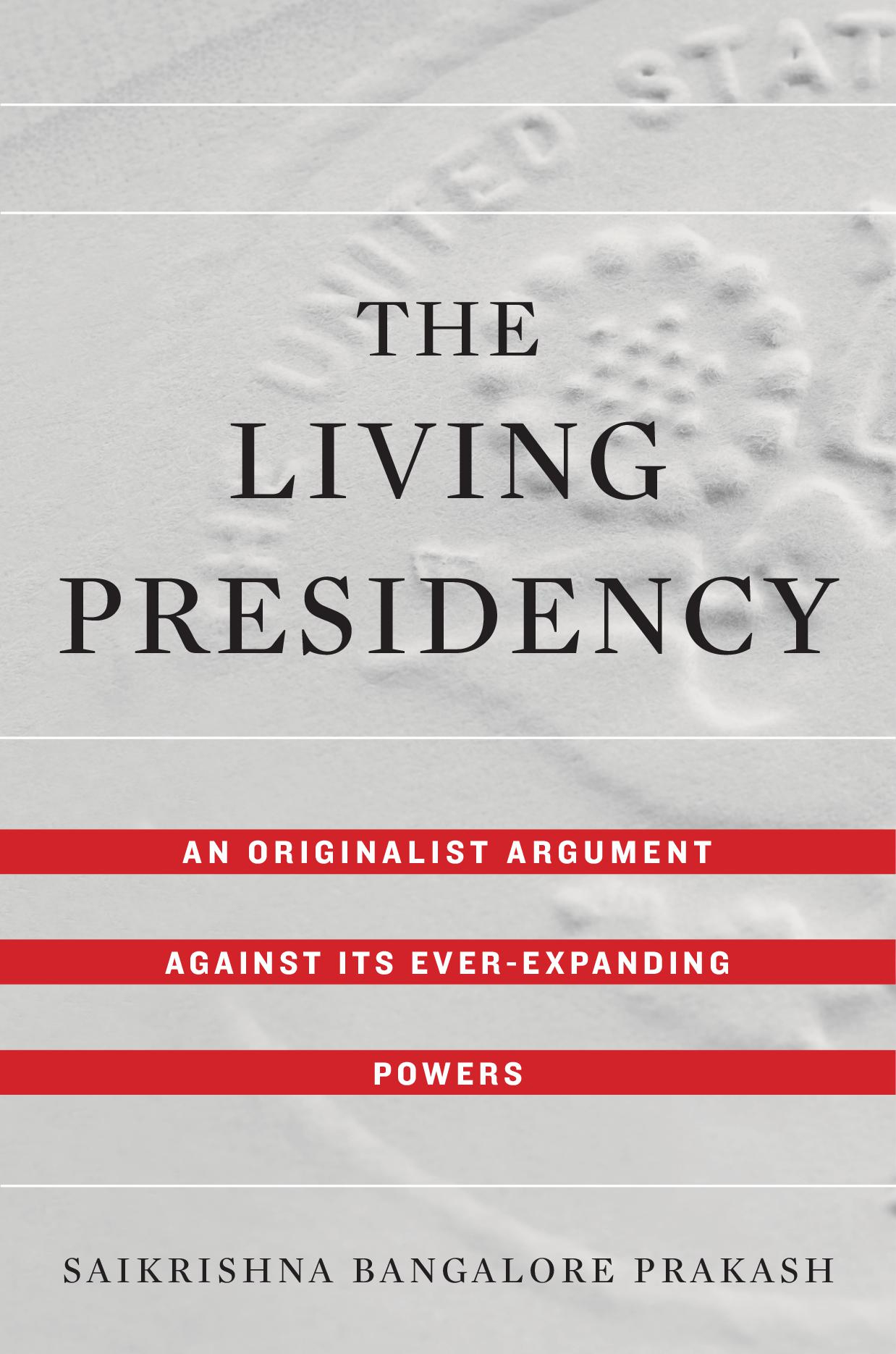
The L IVING P RESIDENCY
An Originalist Argument against Its Ever-Expanding Powers
 SAIKRISHNA BANGALORE PRAKASH
SAIKRISHNA BANGALORE PRAKASH
THE BELKNAP PRESS OF HARVARD UNIVERSITY PRESS
Cambridge, Massachusetts
London, England
2020
Copyright 2020 by the President and Fellows of Harvard College
All rights reserved
Jacket art: imagestock/E+/Getty Images
978-0-674-98798-2 (cloth)
978-0-674-24521-1 (EPUB)
978-0-674-24530-3 (MOBI)
978-0-674-24533-4 (PDF)
The Library of Congress has cataloged the printed edition as follows:
Names: Prakash, Saikrishna Bangalore, author.
Title: The living presidency : an originalist argument against its ever-expanding powers / Saikrishna Bangalore Prakash.
Description: Cambridge, Massachusetts : The Belknap Press of Harvard University Press, 2020. | Includes bibliographical references and index.
Identifiers: LCCN 2019033132
Subjects: LCSH: Executive powerUnited States. | PresidentsLegal status, laws, etc.United States.
Classification: LCC KF5050 .P73 2020 | DDC 342.73/062dc23
LC record available at https://lccn.loc.gov/2019033132
T O N . S URYA R ASHMI R AO,
whose patience and love always expand
Rashmi, nee samanamevaru?
The important thing is the presidency. If need be, save the presidency from the President.
Richard Nixon to Elliot Richardson, 1973
Modern American presidents wield a vast array of constitutional powers, making their office one of the most powerful on earth. They take the nation to war, dispatching our men and women to battle in far-off lands. They make laws with the stroke of a pen, sometimes adding needful provisions and occasionally ignoring inconvenient or unwelcome rules. In foreign affairs, they evade core constitutional clauses, like those related to treaties and spending, in the way that an impatient motorist might bypass bothersome traffic.
It wasnt meant to be this way. Our Founding Fathers certainly did not fashion a Constitution that authorized presidents to amend and expand their constitutional office. Likewise, We the People never chose to transform our presidency, making it more royal and powerful and less executive and duty-bound. As we behold the modern presidency, mull the modifications of the office, and dwell on the Constitutions text, most of us can sense that our presidency is a distortion of the original McCoy. Essentially, our familiar presidency is a funhouse-mirror version of the Founders presidency, except in our reality the carnival version is the lived experience, and not just a silly or grotesque reflection.
We are right to feel uneasy about the future. Congress, charged with making our nations laws, seems obsolete, a place where useless speeches are occasionally punctuated by pointless votes. The courts offer sporadic resistance, but not nearly enough to redirect the trend. They are reactive and slow and, acting alone, are no match for the energetic executive. Attempting to advance policy and personal agendas, our next president likely will continue to push the boundaries of the office outward and grasp at new powers. After all, every modern president supposes that his agenda is wholly just and absolutely necessary, that he alone enjoys a popular mandate, and that the loyal opposition is in fact obstinately obstructionist. Presidents may enter office imagining that they can heal the partisan divide and work across the aisle, but reality eventually sets in. In the context of what seems an unreasonable, even rabid, opposition and an urgent need to fulfill campaign promises and do what is best for the nation, presidents seize authority to do what they believe is necessary and right.
What of the Constitution and its limits? Well, todays presidents recognize that the 2020 Constitution is not the 1789 Constitution, and that as the times change, so does our living Constitution. In this context, why does what George Washington thought about the reach of presidential power matter at all? When it comes to their powers, presidents realize that what matters are the rock-solid needs and demands of today, not the hazy limits and outdated conceptions of an obscure, distant, and rather different past. Sure, Alexander Hamilton, James Wilson, and James Madison were smart, but what could they have known about nuclear bombs or our multi-trillion-dollar high-tech economy? The theories and concerns of the Founders are a poor match for the realities and problems of today. While modern presidents may say a few kind words about the Founders here and there, they see no need to live under the outmoded Constitution of the past. Our living Constitution, with its many informal amendments and its potential for more, better suits their needs.
Be alarmed, but not fearful. No aspiring president, no matter his or her party, will stage an actual coup any time soon. Americas institutions of representative government are too sturdy for that, and besides, the American people would not stand for it. Yet candor requires admitting that for decades weve witnessed something of a creeping constitutional coup. And creeping coups are more likely to succeed because the change is gradual, sometimes imperceptible. Like the proverbial frog in the pot, we often fail to discern some of these changes in the presidency and mostly havent noticed these dangers to our Constitution.
Over more than two centuries, the American presidency has been transformed into what Arthur Schlesinger Jr. called an imperial presidency. We have, in short, a living presidency. It is an office with no fixed limits and with the potential to expand by leaps and bounds.
I do not claim that modern presidents rule without constraints. That is manifestly untrue. There remain legal restraints on the executive, such as the universal expectation that presidents will enforce judicial judgments, including ones that they loathe. Likewise, presidents do not punish the accused outside the justice system. Rather the point is that the modern office grows more powerful over time and that any existing constraints can be overcome in due course. The modern presidency has no enduring limits, no permanent frontiers.
We sometimes fail to notice the absence of any permanent constraints on the presidency because we are too often beguiled by a set of comforting constitutional platitudes. The president cannot make law, we assure ourselves. Presidents cannot make treaties without the Senates consent because it says so in the Constitution. The Constitution cannot be changed via mere practice. Presidents, because they take an oath to preserve, protect and defend the Constitution, cannot violate it, much less amend it.
But in the twenty-first century, these feel-good bromides are false. Our living presidency subverts the idea of an executive subject to the Constitution and to the laws. If presidents can unilaterally alter the Constitution, they can circumvent the document that spells out and limits their authority. The presidents express obligation to preserve, protect and defend the Constitution becomes irrelevant in the face of a practical power to alter, undermine, and subvert the Constitution. Likewise, if presidents can supplement, amend, or ignore federal statutes, they are also lawmakers and they need not take care to faithfully execute Congresss laws.
As this book goes to press in 2020, the incumbent has many on edge. The sense of disquiet surrounding the presidency seems especially acute. Yet despite the pronounced differences in style and rhetoric, Donald Trumps immediate predecessors were little different in their efforts to pursue their agendas and, as a byproduct, expand the office of the chief executive. To be sure, the Republican faithful are quick to blame Democratic presidents; for their part Democrats are apt to indict Republican ones. But if we are honest with ourselves and escape the partisan perspective for a moment, we know in our heart of hearts that the problem has deep roots. Presidents of both parties have aggrandized themselves and the office of the presidency. There are no angels among our recent presidents, at least on questions of presidential power. Whatever noble qualities they may have hadpatriotism, compassion, earnestnesseach has contributed to inflating the powers of the living presidency.
Font size:
Interval:
Bookmark:
Similar books «The Living Presidency: An Originalist Argument against Its Ever-Expanding Powers»
Look at similar books to The Living Presidency: An Originalist Argument against Its Ever-Expanding Powers. We have selected literature similar in name and meaning in the hope of providing readers with more options to find new, interesting, not yet read works.
Discussion, reviews of the book The Living Presidency: An Originalist Argument against Its Ever-Expanding Powers and just readers' own opinions. Leave your comments, write what you think about the work, its meaning or the main characters. Specify what exactly you liked and what you didn't like, and why you think so.

